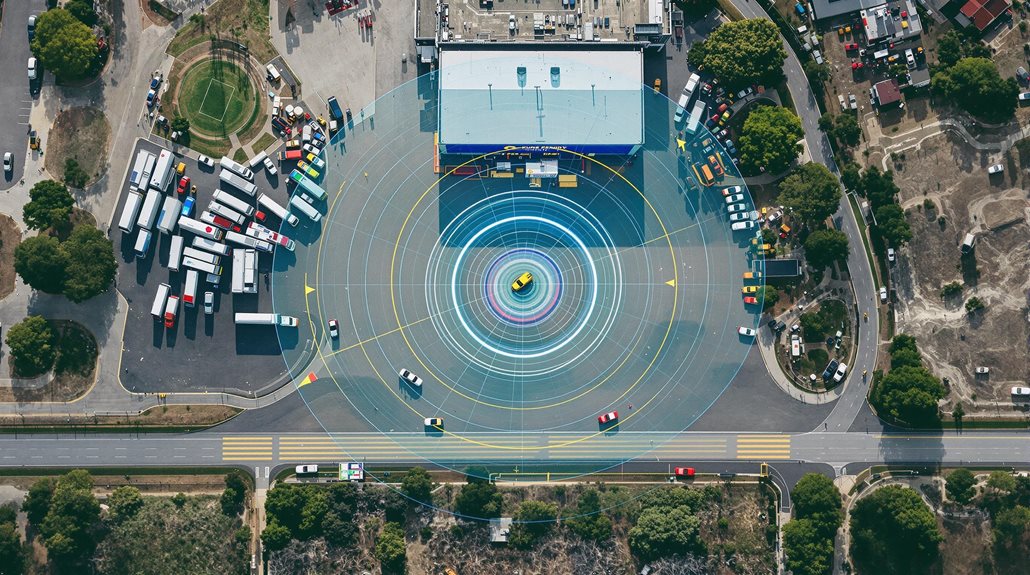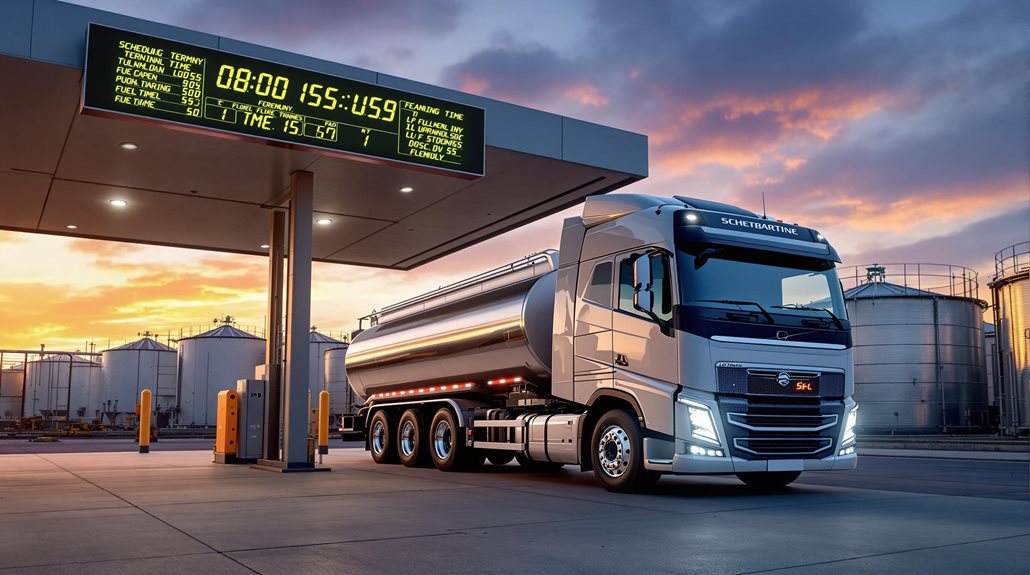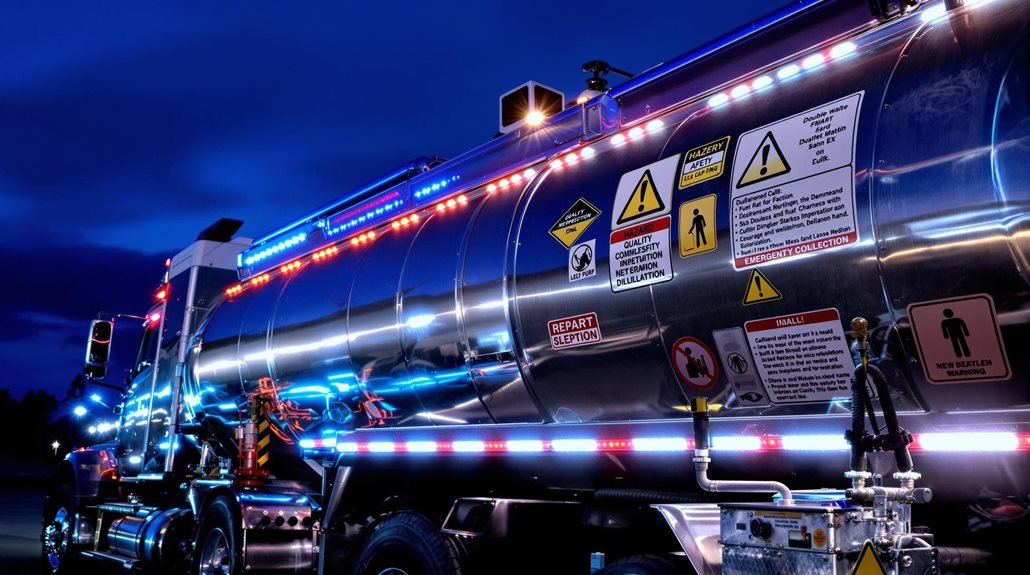When selecting a fuel delivery service, focus on five critical factors that guarantee reliable and cost-effective operations. First, verify the provider's service coverage area and their ability to handle specialized locations. Second, confirm they offer your required fuel types with proper certifications and handling equipment. Third, evaluate their delivery scheduling options, including automatic delivery and emergency services. Fourth, analyze their pricing structure, looking for volume discounts and contract opportunities that can save up to 70 cents per gallon. Fifth, assess their safety protocols and quality control measures. Understanding these key components will illuminate the path to selecting your ideal fuel delivery partner.
Expert Highlights
- Verify the service provider's coverage area and ability to reach your specific location, including remote or specialized sites.
- Compare pricing structures and payment options, looking for volume discounts and transparent terms that match your budget needs.
- Check fuel type availability to ensure the service can deliver your required fuels with proper certifications and equipment.
- Evaluate delivery scheduling flexibility, including automatic delivery, will-call options, and emergency 24/7 service availability.
- Review safety protocols, quality control measures, and driver training programs to ensure reliable and secure fuel delivery.
Understanding Location and Service Coverage

When selecting a fuel delivery service, understanding the provider's location coverage and service availability is pivotal for guaranteeing reliable access to fuel. Begin by verifying whether the provider operates nationally or locally, and confirm their ability to service your specific location, including any remote or challenging areas you might require coverage for. Same-day delivery options ensure you can receive fuel when needed without extended wait times.
Consider providers who demonstrate expansive geographical reach, particularly if your operations span multiple locations or include both urban and rural areas. For businesses with specialized needs, certify the service can accommodate unique locations such as construction sites, industrial zones, or remote facilities. Ensure the provider offers vinyl-lined tanks that can secure and safely transport different types of fuel. A dedicated Denver-based team ensures responsive local service and expert regional knowledge. Additionally, verify their capability to navigate and deliver to areas with specific access requirements or restrictions, as this can drastically impact the reliability and consistency of your fuel supply chain.
Evaluating Fuel Types and Availability
A thorough evaluation of fuel types and their availability represents an essential step in selecting the appropriate delivery service for your needs. When choosing a provider, consider their capacity to deliver specific fuel types that match your requirements, whether it's conventional gasoline, diesel, or alternative fuels. Diesel fuel delivers 113% more energy compared to an equivalent amount of gasoline, making it particularly efficient for heavy-duty applications. Regular unleaded gasoline maintains an octane rating of 87, providing suitable performance for most standard vehicles. Opting for specialized fuels often requires dedicated providers with proper certifications and handling equipment, mirroring the necessity for a professional tire change service.
| Fuel Type | Common Applications | Key Considerations |
|---|---|---|
| Gasoline/E10 | Standard vehicles, equipment | Most widely available, suitable for the majority of needs |
| Low Sulfur Diesel | Heavy machinery, trucks | Higher energy density, specific handling requirements |
| Biodiesel/Renewable | Eco-conscious operations | Limited availability, verify supplier certification |
Understanding these options guarantees optimal performance for your vehicles or equipment. Consider that while traditional fuels like gasoline and diesel are readily available through most services, specialized fuels may require dedicated providers. Verify that your chosen service maintains proper certifications and equipment for handling your specific fuel requirements.
Assessing Delivery Scheduling Options

Through careful consideration of delivery scheduling options, businesses and homeowners can optimize their fuel management strategy while maintaining reliable supply chains. The primary choices include automatic delivery scheduling, which utilizes consumption calculations and weather patterns to guarantee consistent supply, and will-call delivery, offering flexibility for price-conscious consumers who prefer managing their own schedules. Capped fill plans provide predetermined pricing without extra fees or enrollment costs. For those in Minneapolis-St. Paul, reliable delivery must also factor in affordable flat rate pricing for fuel services, ensuring cost-effective options.
For operations requiring maximum reliability, comprehensive solutions incorporate on-site and 24/7 delivery options, providing emergency services and real-time monitoring capabilities. These services particularly benefit commercial fleets and industrial operations where continuous fuel availability is indispensable.
The integration of customer portals and automated tracking systems further enhances operational efficiency, while regular safety inspections during deliveries assure system integrity and compliance with industry standards.
Analyzing Pricing and Payment Terms
Understanding fuel delivery pricing and payment terms requires careful evaluation of multiple cost components and market dynamics. The cost structure typically encompasses factors such as fuel type, delivery distance, quantity ordered, and prevailing market conditions. Businesses can optimize their fuel expenses by leveraging volume discounts and negotiating long-term contracts, potentially saving up to 70 cents per gallon. Payment structures vary among providers, with options including flat rates, variable pricing based on specific factors, and additional charges for specialized services like DEF delivery or emergency fueling. Organizations can maximize cost efficiency by implementing strategic planning measures, such as scheduling bulk deliveries and establishing yearly contracts to stabilize prices. Working with reputable suppliers who offer transparent pricing and flexible payment terms guarantees predictable operational costs while maintaining reliable fuel supply. In case of a vehicle lockout during fuel deliveries, businesses can rely on roadside assistance services to regain access and keep their operations running smoothly.
Safety Standards and Quality Control

Implementing extensive safety standards and quality control measures stands as the cornerstone of reliable fuel delivery services. Professional providers maintain rigorous protocols, including thorough driver training, proper equipment maintenance, and strict adherence to safety procedures during fuel transfers. These measures encompass grounding systems, emergency shut-off protocols, and continuous monitoring of delivery operations. Quality assurance extends beyond safety to include systematic fuel testing and verification procedures. Reputable services conduct regular sampling to guarantee fuel quality meets established standards, monitoring critical parameters such as octane ratings and contaminant levels. They also maintain detailed documentation of maintenance schedules, safety inspections, and quality control processes. Consider providers with proactive communication systems to ensure customer satisfaction and seamless coordination in case of any roadside assistance needs. When evaluating potential providers, verify their commitment to these standards through certified training programs, documented safety records, and established emergency response protocols.
Roadside Assistance FAQ
Can I Track My Fuel Delivery in Real-Time Through a Mobile App?
Yes, modern fuel delivery apps offer real-time GPS tracking, allowing you to monitor your delivery truck's location, receive push notifications, and view accurate estimated arrival times through intuitive interfaces.
What Happens if There's a Fuel Spill During Delivery?
Professional fuel delivery teams immediately secure the area, contain the spill using barriers and absorbents, stop the source, notify authorities, and initiate cleanup procedures to protect your safety and environment.
Do I Need Someone Present When Fuel Is Delivered?
Yes, a trained representative should be present during fuel delivery to monitor the process, guarantee safety protocols are followed, and respond immediately to any potential spills or emergencies.
Are There Loyalty Programs or Volume Discounts for Regular Customers?
Many fuel delivery services offer loyalty programs with tiered benefits, points systems, and volume discounts. Regular customers can earn rewards like price reductions, priority scheduling, and exclusive member perks.
How Quickly Can Emergency Fuel Delivery Be Arranged During Off-Hours?
Emergency fuel delivery services are available 24/7/365, typically arriving within 1-3 hours of your call. Our dedicated team uses GPS tracking to guarantee rapid response regardless of time or location.
